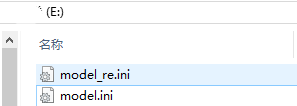Python导出隐马尔科模型参数到JSON文件C语言读取
本文主要演示Python导出JSON文件,将模型参数保存到JSON文件,然后由C语言调用从JSON读取模型参数,读取具体参数,最后打印输出。
Python 导出隐马尔科夫模型参数
在Python中训练好模型后,将模型参数保存到Python字典中,然后调用json模块的dump函数,将字典整体以JSON格式保存到文件中。
参数导出
Python导出的数据有矩阵,数组,整数与字符串。下面是Python代码。
import numpy as np
import os
import json
import joblib
def model_export_test():
para = dict()
para['n'] = 2
para['ft'] = 2
para['m'] = [
[
0.65985107421875,
4.225499739584418,
],
[
0.366943359375,
12.658813626901697,
],
]
para['c'] = [
[
0.011996133774518967,
3.7065230565392455,
],
[
0.018222754001617433,
4.0523744826252015,
],
],
para['s'] = [
0.15384615384615385,
0.07692307692307693,
],
para['t'] = [
[
0.6666666666666666,
0.0,
],
[
0.0,
0.5,
],
],
para['ftType'] = 'ft30'
para['sTNum'] = 1
para['sTList'] = [1]
return para
if '__main__' == __name__:
para = dict()
para['model_num'] = 2
para['model1'] = model_export_test()
para['model2'] = model_export_test()
f = open(r'E:\\model.ini', 'wt')
json.dump(para, f)
f.close()
格式转换
由于json.dump导出的参数无换行,即所有数据都在同一行,阅读困难,因此需要根据数据添加换行符。在Python命令行中调用josn.tool完成格式转换。
python -m json.tool model.ini model_re.ini
命令执行过程图,如下。

命令执行结果

命令执行效果

从上图中可以看出,转换格式后,数据很容易阅读。
C语言读取模型参数
调用从cJSON读取JSON文件
调用从JSON中的cJSON_Parse函数读取JSON文件中的参数,cJSON_Parse返回的参数是结构的循环链表。文件读取代码如下。
FILE *f;long len;char *data;
int ret = -1;
f=fopen(filename,"rb");fseek(f,0,SEEK_END);len=ftell(f);fseek(f,0,SEEK_SET);
data=(char*)malloc(len+1);fread(data,1,len,f);fclose(f);
/* doit(data); */
char *out;cJSON *json;
json=cJSON_Parse(data);
printf("json file name:%s \n", filename);
printf("type: %d \n", json->type);
参数再提取
cJSON读取的数据不方便直接使用,因此需要做进一步整理,本文是将模型参数提取到模型结构体数组中。
int readHmodelParaFromfile1(char *filename, modelPara1_t *modelPara, int model_num)
{
FILE *f;long len;char *data;
int ret = -1;
f=fopen(filename,"rb");fseek(f,0,SEEK_END);len=ftell(f);fseek(f,0,SEEK_SET);
data=(char*)malloc(len+1);fread(data,1,len,f);fclose(f);
/* doit(data); */
char *out;cJSON *json;
json=cJSON_Parse(data);
printf("json file name:%s \n", filename);
printf("type: %d \n", json->type);
int numentries=0;
cJSON *child, *child_bf;
child = json->child;
while (child) numentries++,child=child->next;
printf("numentries:%d \n", numentries);
if(!json || numentries != json->child->valueint && 0 != strcmp(json->child->string, MODEL_NUM) || model_num < numentries)
{
printf("model file error !!!!!!!!!\n");
return ret;
}
child_bf = json->child;
int numentries_idx = 1;
while(numentries_idx < numentries)
{
/*
out=cJSON_Print(json);
cJSON_Delete(json);
printf("%s\n",out);
free(out);
*/
child_bf = child_bf->next;
child = child_bf->child;
getintValueUsingName(child, &modelPara->fNumber, "n");
getintValueUsingName(child, &modelPara->nNumber, "ft");
printf("n:%d f:%d\n\n", modelPara->nNumber, modelPara->fNumber);
modelPara->m = malloc(sizeof(double) * modelPara->nNumber * modelPara->fNumber);
ret = getMatUsingName(child, modelPara->m, (char *)MODEL_M_NAME, modelPara->nNumber, modelPara->fNumber);
printf("%s ret:%d value:%lf\n\n", MODEL_M_NAME, ret, modelPara->m[modelPara->nNumber * modelPara->fNumber - 1]);
modelPara->c = malloc(sizeof(double) * modelPara->nNumber * modelPara->fNumber);
ret = getMatUsingName(child, modelPara->c, (char *)MODEL_C_NAME, modelPara->nNumber, modelPara->fNumber);
printf("%s ret:%d value:%lf\n\n", MODEL_C_NAME, ret, modelPara->c[modelPara->nNumber * modelPara->fNumber - 1]);
mat_check_maximum(modelPara->c, modelPara->nNumber, modelPara->fNumber);
modelPara->s = malloc(sizeof(double) * modelPara->nNumber);
ret = getMatUsingName(child, modelPara->s, (char *)MODEL_S_NAME, 1, modelPara->nNumber);
printf("%s ret:%d value:%lf\n\n", MODEL_S_NAME, ret, modelPara->s[modelPara->nNumber - 1]);
modelPara->t = malloc(sizeof(double) * modelPara->nNumber * modelPara->nNumber);
ret = getMatUsingName(child, modelPara->t, (char *)MODEL_T_NAME, modelPara->nNumber, modelPara->nNumber);
printf("%s ret:%d value:%lf\n\n", MODEL_T_NAME, ret, modelPara->t[modelPara->nNumber * modelPara->nNumber - 1]);
ret = getintValueUsingName(child, &modelPara->sTNum, "sTNum");
printf("%s ret:%d value:%d\n\n", "sTNum", ret, modelPara->sTNum);
modelPara->sTList = malloc(sizeof(double) * modelPara->sTNum);
ret = getArrayUsingName(child, modelPara->sTList, "sTList", modelPara->sTNum);
printf("%s ret:%d value:%lf\n\n", "sTList", ret, modelPara->sTList[modelPara->sTNum - 1]);
ret = getstringUsingName(child, modelPara->type, 127, "ftType");
printf("%s ret:%d value:%s\n\n", "ftType", ret, modelPara->type);
modelPara++;
numentries_idx++;
}
cJSON_Delete(json);
free(data);
return ret;
}
参数打印函数
void print_model_matpara(modelPara_t *modelPara)
{
int i,j;
if(modelPara->m)
{
printf("m[%d][%d]:\n", modelPara->nNumber, modelPara->fNumber);
for(i=0; i<modelPara->nNumber; i++)
{
for(j=0; j<modelPara->fNumber; j++)
{
printf("%lf ", modelPara->m[i*modelPara->fNumber + j]);
}
printf("\n");
}
}
if(modelPara->c)
{
printf("c[%d][%d]:\n", modelPara->nNumber, modelPara->fNumber);
for(i=0; i<modelPara->nNumber; i++)
{
for(j=0; j<modelPara->fNumber; j++)
{
printf("%lf ", modelPara->c[i*modelPara->fNumber + j]);
}
printf("\n");
}
}
if(modelPara->s)
{
printf("s[%d]:\n", modelPara->nNumber);
for(i=0; i<1; i++)
{
for(j=0; j<modelPara->nNumber; j++)
{
printf("%lf ", modelPara->s[i*modelPara->nNumber + j]);
}
printf("\n");
}
}
if(modelPara->t)
{
printf("t[%d][%d]:\n", modelPara->nNumber, modelPara->nNumber);
for(i=0; i<modelPara->nNumber; i++)
{
for(j=0; j<modelPara->nNumber; j++)
{
printf("%lf ", modelPara->t[i*modelPara->nNumber + j]);
}
printf("\n");
}
}
if(0 < modelPara->score_th_num)
{
printf("\n score_th_list[%d]:\n", modelPara->score_th_num);
for(i=0; i<modelPara->score_th_num; i++)
{
printf("%lf ", modelPara->score_th_list[i]);
}
printf("\n");
}
printf("\n height_th: %lf\n", modelPara->height_th);
printf("\n height_max_th: %lf\n", modelPara->height_max_th);
if(0 < modelPara->decay_factor_num)
{
printf("\ndecay_factor_num[%d]:\n", modelPara->decay_factor_num);
for(i=0; i<modelPara->decay_factor_num; i++)
{
printf("%lf ", modelPara->decay_factor_list[i]);
}
printf("\n");
}
if(0 < modelPara->sub_times_num)
{
printf("\nsub_times_num[%d]:\n", modelPara->sub_times_num);
for(i=0; i<modelPara->sub_times_num; i++)
{
printf("%lf ", modelPara->sub_times_list[i]);
}
printf("\n");
}
printf("\n up_th: %lf\n", modelPara->up_th);
printf("\n up_num_th: %d\n", modelPara->up_num_th);
printf("\n down_num_th: %d\n", modelPara->down_num_th);
printf("\n peak_max_th: %lf\n", modelPara->peak_max_th);
if(0 < modelPara->dumpling_num)
{
printf("\n dumpling_num: %d\n", modelPara->dumpling_num);
}
printf("\n fl: %d\n", modelPara->fl);
printf("\n fs: %d\n", modelPara->fs);
printf("\n pre_times: %lf\n", modelPara->pre_times);
printf("\n late_time: %lf\n", modelPara->late_time);
printf("\n ft_type: %s\n", modelPara->ft_type);
printf("\n band_num: %d\n", modelPara->band_num);
printf("\n frq_start: %lf\n", modelPara->frq_start);
printf("\n frq_end: %lf\n", modelPara->frq_end);
}
主函数
int main (int argc, const char * argv[]) {
modelPara1_t modelPara[10];
/* dofile("./json.ini"); */
readHmodelParaFromfile1("./model_re.ini", modelPara, 10);
printf("\n\n model 1\n\n");
print_model_matpara1(modelPara);
printf("\n\n model 2\n\n");
print_model_matpara1(&modelPara[1]);
return 0;
}
C读取效果

























 1251
1251











 被折叠的 条评论
为什么被折叠?
被折叠的 条评论
为什么被折叠?










